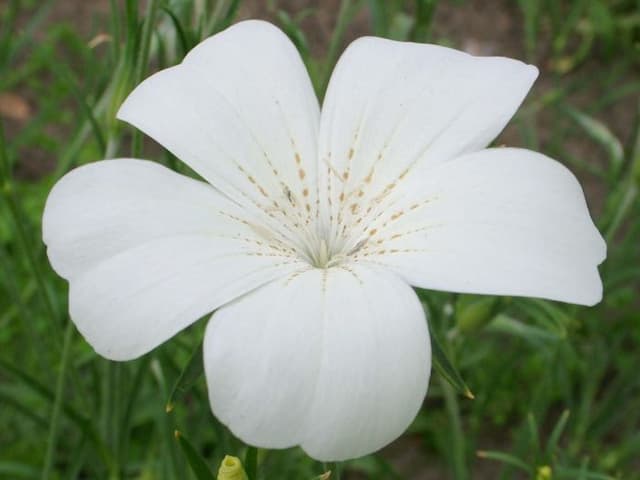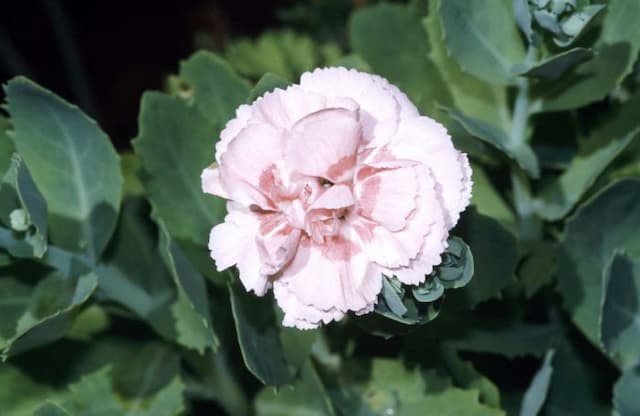Carnation Dianthus Pinball Wizard = 'Wp15mow08' (p)

ABOUT
The Dianthus Pinball Wizard, known more commonly as 'Pinks,' is a striking ornamental plant with a vibrant and eye-catching appearance. Its foliage is a blue-green color, presenting a bright contrast to the flowers it bears. 'Pinks' are well-known for their fringed or serrated petal edges, which give them a textured and intricate look. The blooms themselves are remarkably colorful and often come in various shades of pink, red, white, or bicolor patterns, marked with contrasting rings or patches that add to their uniqueness. The flowers of the Dianthus Pinball Wizard emit a delightful fragrance, reminiscent of cloves or a spicy, sweet perfume, which makes them a favorite among gardeners for sensory gardens. The blooms are typically arranged in clusters atop slender, upright stems that stand above the compact tufts of foliage, creating a showy display when they are in full bloom. Each flower is made up of five petals, and the overall shape can be described as a broad, flat disk, sometimes appearing ruffled or feathered due to their fringed edges. The center of the bloom often features a different hue or a deeper concentration of color, drawing attention and adding to the visual interest of the plant. With their lush, vivid blooms and attractive greenery, Dianthus Pinball Wizard 'Pinks' add a pop of color and a classic touch to any garden or floral arrangement.
About this plant
 Names
NamesFamily
Caryophyllaceae
Synonyms
Pinball Wizard Pinks, Pinball Wizard Carnation
Common names
Dianthus 'Wp15mow08'.
 Toxicity
ToxicityTo humans
The plant commonly known as Carnation, specifically the Dianthus Pinball Wizard, does not have a well-documented toxicity profile for humans. It is generally considered non-toxic, and there are no widely recognized symptoms of poisoning from ingesting this plant. Therefore, accidental ingestion is not typically associated with severe health consequences. However, as with any plant, individual allergies or sensitivities could occur, resulting in mild symptoms like gastrointestinal discomfort or skin irritation.
To pets
The common Carnation, including the variety Dianthus Pinball Wizard, is considered mildly toxic to pets. Ingestion can lead to gastrointestinal upset, including symptoms such as vomiting and diarrhea. While it is not considered highly poisonous, if a pet consumes a significant quantity of the plant, monitoring for any signs of distress and contacting a veterinarian would be advisable. It is always best to prevent pets from ingesting plants not intended for consumption to avoid any potential issues.
 Characteristics
CharacteristicsLife cycle
Perennials
Foliage type
Evergreen
Color of leaves
Blue-green
Flower color
Mixed
Height
0.5-1 feet (15-30 cm)
Spread
0.5-1 feet (15-30 cm)
Plant type
Herb
Hardiness zones
5-9
Native area
Europe Asia
Benefits
 General Benefits
General Benefits- Easy to Grow: The plant is well-suited for novice gardeners as it is relatively easy to cultivate and maintain under right conditions.
- Attracts Wildlife: It can attract butterflies and other beneficial pollinators to the garden, enhancing biodiversity.
- Long Blooming: The Dianthus variety offers an extended blooming period, which provides a garden with long-lasting color and visual interest.
- Drought Tolerant: Once established, the plant can tolerate periods of dryness, making it suitable for gardens in drier climates or for more water-wise landscaping.
- Fragrant Flowers: The blooms often emit a pleasant fragrance, which can add an aromatic dimension to garden spaces.
- Compact Growth: The plant typically exhibits a neat and compact growth habit, which makes it ideal for borders, containers or small garden spaces.
- Deer Resistant: It is generally resistant to deer, reducing the likelihood of damage from grazing in areas with deer populations.
- Variety of Uses: Suitable for use in cut flower arrangements, rock gardens, and as edges in garden beds or walkways.
 Medical Properties
Medical Properties Air-purifying Qualities
Air-purifying QualitiesThis plant is not specifically known for air purifying qualities.
 Other Uses
Other Uses- Craft Projects: The vibrant petals of Dianthus can be pressed and used in scrapbooking or card making, adding natural beauty to creative designs.
- Edible Decorations: Dianthus flowers are edible and can be used to add color and a mild spicy flavor to salads, desserts, or as embellishments on cakes and pastries.
- Bookmark Creation: Pressed Dianthus flowers can be laminated or placed between clear adhesive sheets to create delicate and attractive bookmarks.
- Plant Dye: The petals of Dianthus can be used to create natural dyes for fabric or paper, yielding shades of pink and red.
- Scented Sachets: The fragrant flowers of Dianthus can be dried and placed into small pouches to create scented sachets for drawers and closets.
- Wedding Confetti: Dried Dianthus petals can serve as a biodegradable and colorful alternative to traditional confetti at weddings.
- Natural Potpourri: Combine dried Dianthus flowers with other herbs and spices to create a homemade potpourri with a pleasant fragrance.
- Candle Embeds: Fresh or dried Dianthus petals can be embedded into candles to add a decorative touch and subtle scent when the candle burns.
- Bath Bombs: Dianthus petals can be incorporated into homemade bath bombs for a touch of color and a hint of floral scent during a relaxing bath.
- Culinary Oil Infusions: Dianthus petals can be infused into oils to impart their flavor and color, ideal for use in gourmet cooking or as salad dressings.
Interesting Facts
 Feng Shui
Feng ShuiThe Dianthus, commonly known as Carnation or Pink, is not used in Feng Shui practice.
 Zodiac Sign Compitability
Zodiac Sign CompitabilityThe Carnation is not used in astrology practice.
 Plant Symbolism
Plant Symbolism- Divine Love: The genus name Dianthus is derived from the Greek words 'dios' (god) and 'anthos' (flower), often translated to 'the flowers of the gods', symbolizing divine love.
- Boldness: The vivid coloring and striking patterns of 'Pinball Wizard' carnations typically signify boldness and audacity, reflecting the striking impact of its appearance.
- Admiration: Carnations are commonly associated with admiration. The unique pattern of the 'Pinball Wizard' may heighten this symbolism, indicating deep fascination and high regard.
- Distinction: The specific cultivar 'Pinball Wizard' with its distinctive look could symbolize the desire to stand out and be noticed, similar to how it distinguishes itself from other flowers.
- Pure Affection: Carnations often symbolize pure love and affection, signifying the strong and pure emotional attachment one might have for another.
 Water
WaterThe Dianthus 'Pinball Wizard', commonly known as Pinks or Carnation, should be watered thoroughly, allowing the soil to become moist without becoming waterlogged. Water the plant when the top inch of soil feels dry to the touch, which typically equates to about once a week, depending on climate conditions. During hot, dry periods, you may need to water the plant more frequently. It's best to use a watering can or hose with a gentle spray setting to avoid disrupting the soil or damaging the foliage. An average-sized Dianthus 'Pinball Wizard' should receive approximately half a gallon of water at each watering to ensure the root zone is adequately saturated.
 Light
LightPinks prefer full sun to partial shade with at least six hours of direct sunlight per day. The ideal spot for Dianthus 'Pinball Wizard' is a location where it can receive morning sun and afternoon shade, especially in hotter climates, to prevent the foliage from burning. Ensure the plant is placed in an area with bright, indirect light if it cannot receive sufficient direct sunlight.
 Temperature
TemperatureDianthus 'Pinball Wizard' is hardy in a wide temperature range and can tolerate temperatures down to about 20 degrees Fahrenheit. While the plant can survive brief periods of colder temperatures, it thrives in conditions where the temperature remains between 60 and 70 degrees Fahrenheit. To maintain vigorous growth, protect the plant from extreme heat, ensuring it doesn’t stay consistently above 85 degrees Fahrenheit.
 Pruning
PruningPruning Dianthus 'Pinball Wizard' is essential to encourage bushy growth and continuous blooming. Deadheading, or removing faded flowers, should be done regularly throughout the blooming season to promote new blooms. After the main flowering period, cut back the stems by one-third to rejuvenate the plant and possibly stimulate a second flush of flowers. The best time for a more substantial pruning is late winter or early spring before new growth emerges.
 Cleaning
CleaningAs needed
 Soil
SoilThe best soil mix for the Dianthus 'Pinball Wizard' is well-draining, fertile, and slightly alkaline, with an ideal pH of around 7.0-7.5. Use a mix consisting of loam, sand, and compost or well-rotted manure to ensure the right drainage and nutrient balance. Avoid soils that are too heavy or waterlogged to prevent root rot.
 Repotting
RepottingDianthus 'Pinball Wizard' doesn't require frequent repotting and can often be repotted every 2-3 years. It's best to repot in the spring before the onset of rapid growth.
 Humidity & Misting
Humidity & MistingThe Dianthus 'Pinball Wizard' prefers moderate humidity levels, typical of outdoor environments. While it can adapt to the humidity in most home environments, this plant doesn't require especially high humidity.
 Suitable locations
Suitable locationsIndoor
Provide bright light, well-draining soil, and moderate watering.
Outdoor
Plant in full sun, well-drained soil, and space 12-18 inches apart.
Hardiness zone
4-9 USDA
 Life cycle
Life cycleThe life of a Dianthus Pinball Wizard begins as a seed, which when sown in favourable conditions—well-drained soil and partial to full sunlight—germinates within a week to 2 weeks. After germination, the seedling emerges and over several weeks develops a rosette of narrow, green leaves. As it matures into a young plant, it starts to form sturdy stems and the distinctive dense clusters of fringed or serrated edge flowers that are often pink, red, white, or bi-colored, with a notable sweet fragrance. The Dianthus Pinball Wizard reaches full bloom in late spring to early summer and may rebloom if deadheaded regularly. Throughout its growing season, this perennial establishes a strong root system and foliage. After flowering, it enters a period of dormancy in late fall or winter, where it conserves energy before restarting its growth cycle in the following spring.
 Propogation
PropogationPropogation time
Spring to Summer
The Dianthus Pinball Wizard is commonly propagated through cutting, the most popular method for this variety. This is typically done in late spring to early summer when the plant's growth is most vigorous. To propagate, a gardener would take a 4 to 6 inch (10 to 15 cm) stem cutting just below a node, ensuring that there are at least two or three pairs of leaves on the cutting. The lower leaves are removed and the cut end might be dipped in rooting hormone to encourage root development. The cutting is then placed in a well-draining soil mix, kept moist, and covered with a plastic dome or placed in a propagator to retain humidity until roots develop, which usually takes a few weeks. This method is favored for its efficiency and high success rate in producing new plants that are true to the parent's characteristics.








![Pink [Bubblegum]](/_next/image?url=https%3A%2F%2Fplants-admin.emdemapps.com%2Fimages%2Fplants%2F%2Fimages%2F604b596f31cbb.png&w=640&q=75)
